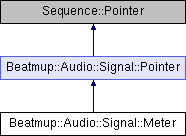Public Types |
Public Member Functions |
Static Public Member Functions |
Private Member Functions |
Static Private Member Functions |
Private Attributes |
List of all members
Beatmup::Audio::Signal::Meter Class Reference
Signal dynamics meter. More...
#include <signal.h>
Inheritance diagram for Beatmup::Audio::Signal::Meter:

Public Types | |
| enum class | MeasuringMode { preciseUsingSamples , approximateUsingLookup , preciseUsingLookupAndSamples } |
| Specifies how to compute signal dynamics (minima and maxima in a given period of time) More... | |
Public Member Functions | |
| Meter (Signal &signal, dtime time, MeasuringMode mode=MeasuringMode::approximateUsingLookup) | |
| Constructs a new meter. More... | |
| template<typename sample > | |
| void | measure (dtime len, int resolution, sample min[], sample max[]) |
| Measures signal dynamics in a given period of time. More... | |
| void | setMode (MeasuringMode newMode) |
| template<> | |
| void | measure (dtime len, int resolution, sample16 min[], sample16 max[]) |
 Public Member Functions inherited from Beatmup::Audio::Signal::Pointer Public Member Functions inherited from Beatmup::Audio::Signal::Pointer | |
| Pointer (Signal &signal, dtime time, bool writing) | |
| virtual void | releaseBuffer () |
| unsigned char | getChannelCount () const |
Static Public Member Functions | |
| static void | prepareSignal (Signal &signal, bool runTask=true) |
| Precomputes the dynamics lookup all over the signal, where needed. More... | |
Private Member Functions | |
| template<typename sample > | |
| void | measureInFragments (dtime len, int resolution, sample *min, sample *max) |
| Measures signal dynamics in a given period of time. More... | |
Static Private Member Functions | |
| static void | prepare (Signal &signal, int skipOnStart=0, int numSteps=1) |
Private Attributes | |
| MeasuringMode | mode |
Detailed Description
Member Enumeration Documentation
◆ MeasuringMode
|
strong |
Specifies how to compute signal dynamics (minima and maxima in a given period of time)
Definition at line 76 of file signal.h.
85 It is guaranteed that the resulting approximated dynamic range covers the precise range. Very fast for less
86 fragmented signals, does not hit the sample data in memory, but requires precomputing and increases the
Constructor & Destructor Documentation
◆ Meter()
| Signal::Meter::Meter | ( | Signal & | signal, |
| dtime | time, | ||
| MeasuringMode | mode = MeasuringMode::approximateUsingLookup |
||
| ) |
Constructs a new meter.
- Parameters
-
signal The signal to measure time Initial time to start measurements from mode Algorithm used to measure the signal dynamics
Definition at line 197 of file signal.cpp.
Pointer(Signal &signal, dtime time, bool writing)
Definition: signal.cpp:143
Member Function Documentation
◆ measureInFragments()
template<typename sample >
|
private |
Measures signal dynamics in a given period of time.
Deals with the fragmentation. The sample type must be coherent to the actual sample format of the signal.
- Parameters
-
len Period length in samples resolution Number of output points min Channelwise multiplexed magnitude minima, (resolution) points per channel max Channelwise multiplexed magnitude maxima, (resolution) points per channel
Definition at line 227 of file signal.cpp.
250 ((SignalFragment*)pointer.fragment)->measureDynamics(fragStart, pointer.offset + pointer.length, pMin, pMax, mode);
254 ((SignalFragment*)pointer.fragment)->measureDynamics(fragStart, pointer.offset + t1 - getTime(), pMin, pMax, mode);
CustomPoint< numeric > min(const CustomPoint< numeric > &a, const CustomPoint< numeric > &b)
Definition: geometry.h:724
CustomPoint< numeric > max(const CustomPoint< numeric > &a, const CustomPoint< numeric > &b)
Definition: geometry.h:728
◆ prepare()
|
staticprivate |
Definition at line 183 of file signal.cpp.
Meter(Signal &signal, dtime time, MeasuringMode mode=MeasuringMode::approximateUsingLookup)
Constructs a new meter.
Definition: signal.cpp:197
@ approximateUsingLookup
Find an approximated range using a lookup tree.
◆ prepareSignal()
|
static |
Precomputes the dynamics lookup all over the signal, where needed.
- Parameters
-
signal The signal to process runTask If true, a task will be run in the context of the signal allowing to process it in parallel; otherwise the computation is done directly in the calling thread
Definition at line 202 of file signal.cpp.
214 TaskDeviceRequirement getExecutionMode() const { return AbstractTask::TaskDeviceRequirement::CPU_ONLY; }
Task: an operation that can be executed by multiple threads in parallel.
Definition: parallelism.h:90
static void prepare(Signal &signal, int skipOnStart=0, int numSteps=1)
Definition: signal.cpp:183
float performTask(AbstractTask &task, const PoolIndex pool=DEFAULT_POOL)
Performs a given task.
Definition: context.cpp:240
virtual ThreadIndex numThreads() const =0
static const ThreadIndex MAX_THREAD_INDEX
maximum possible thread index value
Definition: parallelism.h:71
◆ measure() [1/2]
template<typename sample >
| void Beatmup::Audio::Signal::Meter::measure | ( | dtime | len, |
| int | resolution, | ||
| sample | min[], | ||
| sample | max[] | ||
| ) |
Measures signal dynamics in a given period of time.
- Parameters
-
len Period length in samples resolution Number of output points min Channelwise multiplexed magnitude minima, (resolution) points per channel max Channelwise multiplexed magnitude maxima, (resolution) points per channel
◆ setMode()
|
inline |
◆ measure() [2/2]
template<>
| void Beatmup::Audio::Signal::Meter::measure | ( | dtime | len, |
| int | resolution, | ||
| sample16 | min[], | ||
| sample16 | max[] | ||
| ) |
Definition at line 273 of file signal.cpp.
void measureInFragments(dtime len, int resolution, sample *min, sample *max)
Measures signal dynamics in a given period of time.
Definition: signal.cpp:227
Definition: sample_arithmetic.h:57
Definition: sample_arithmetic.h:71
Definition: sample_arithmetic.h:85
Definition: sample_arithmetic.h:43
Member Data Documentation
◆ mode
|
private |
The documentation for this class was generated from the following files:
- core/audio/signal.h
- core/audio/signal.cpp